名词性从句状语从句
状语从句与名词性从句的区别
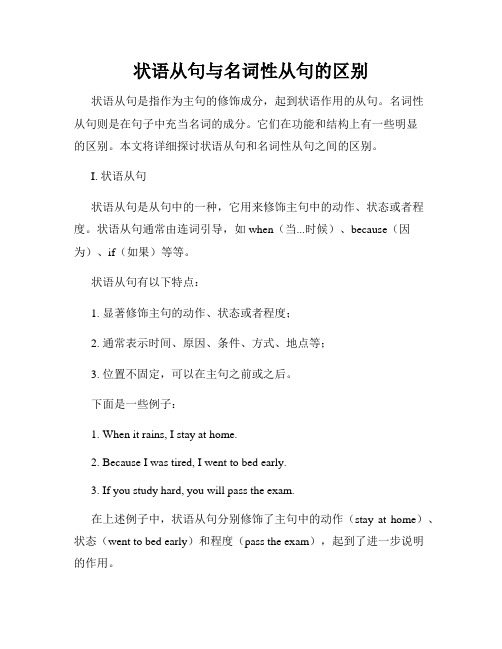
状语从句与名词性从句的区别状语从句是指作为主句的修饰成分,起到状语作用的从句。
名词性从句则是在句子中充当名词的成分。
它们在功能和结构上有一些明显的区别。
本文将详细探讨状语从句和名词性从句之间的区别。
I. 状语从句状语从句是从句中的一种,它用来修饰主句中的动作、状态或者程度。
状语从句通常由连词引导,如when(当...时候)、because(因为)、if(如果)等等。
状语从句有以下特点:1. 显著修饰主句的动作、状态或者程度;2. 通常表示时间、原因、条件、方式、地点等;3. 位置不固定,可以在主句之前或之后。
下面是一些例子:1. When it rains, I stay at home.2. Because I was tired, I went to bed early.3. If you study hard, you will pass the exam.在上述例子中,状语从句分别修饰了主句中的动作(stay at home)、状态(went to bed early)和程度(pass the exam),起到了进一步说明的作用。
II. 名词性从句名词性从句是从句中的一种,它在句子中充当名词的成分,可以作为主语、宾语、表语或者同位语。
名词性从句通常由连词或连词词组引导,如that(那)、whether(是否)、what(什么)、who(谁)等等。
名词性从句有以下特点:1. 充当句子的一个成分,通常是主语、宾语或表语;2. 位置相对固定,通常位于主句之后;3. 通常引导引导词后面有个逗号。
下面是一些例子:1. What he said is true.2. Whether she will come to the party is uncertain.3. I don't know who wrote this book.在上述例子中,名词性从句分别充当了主语(What he said)、宾语(Whether she will come to the party)和表语(who wrote this book),起到了名词的作用。
高中英语知识点归纳名词性从句与状语从句的区别

高中英语知识点归纳名词性从句与状语从句的区别名词性从句与状语从句是英语中常见的从句类型,它们在语法结构和句子功能等方面存在一定的区别。
本文将对这两种从句进行归纳总结,以帮助高中学生更好地理解和运用它们。
一、名词性从句名词性从句在句子中充当名词的功能,可以作主语、宾语、表语或介词宾语。
根据从句与主句之间的关系,名词性从句可分为主语从句、宾语从句、表语从句和同位语从句。
1. 主语从句主语从句在句子中作主语,常由连接词that引导,也可以用连接词whether/if引导。
例如:- That he is late again is really annoying.(他再次迟到真令人恼火。
)- Whether he will come to the party is still uncertain.(他是否会来参加聚会还不确定。
)2. 宾语从句宾语从句在句子中作及物动词的宾语,常由连接词that引导,也可以用连接词whether/if引导。
例如:- She said that she would help me with my homework.(她说她会帮我做作业。
)- I wonder whether/if he has received my message.(我想知道他是否收到了我的消息。
)3. 表语从句表语从句在句子中作表语,常由连接词that引导,也可以用连接词whether/if引导。
例如:- His dream is that he can travel around the world.(他的梦想是能够环游世界。
)- The question is whether/if she can pass the exam.(问题是她能否通过考试。
)4. 同位语从句同位语从句与名词并列,对名词进行解释、补充或说明。
它一般由连接词that引导。
例如:- The fact that he lied surprised everyone.(他撒谎的事实让每个人都感到惊讶。
状语从句与名词性从句的区别与联系
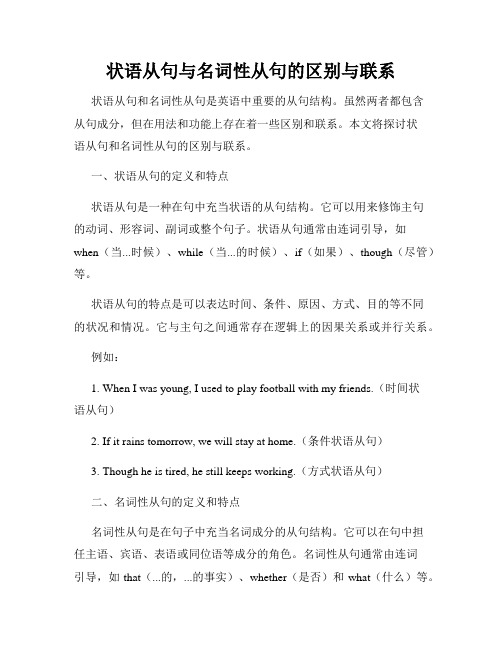
状语从句与名词性从句的区别与联系状语从句和名词性从句是英语中重要的从句结构。
虽然两者都包含从句成分,但在用法和功能上存在着一些区别和联系。
本文将探讨状语从句和名词性从句的区别与联系。
一、状语从句的定义和特点状语从句是一种在句中充当状语的从句结构。
它可以用来修饰主句的动词、形容词、副词或整个句子。
状语从句通常由连词引导,如when(当...时候)、while(当...的时候)、if(如果)、though(尽管)等。
状语从句的特点是可以表达时间、条件、原因、方式、目的等不同的状况和情况。
它与主句之间通常存在逻辑上的因果关系或并行关系。
例如:1. When I was young, I used to play football with my friends.(时间状语从句)2. If it rains tomorrow, we will stay at home.(条件状语从句)3. Though he is tired, he still keeps working.(方式状语从句)二、名词性从句的定义和特点名词性从句是在句子中充当名词成分的从句结构。
它可以在句中担任主语、宾语、表语或同位语等成分的角色。
名词性从句通常由连词引导,如that(...的,...的事实)、whether(是否)和what(什么)等。
名词性从句的特点是具有名词的功能,可以在句子中起到名词所起的作用。
它可以作为主语来引导句子的内容,也可以作为宾语接受动词的作用,还可以作为表语或同位语说明某一事物的性质或身份。
例如:1. What you said is true.(主语从句)2. I don't know whether he will come or not.(宾语从句)3. Her wish is that she can study abroad.(表语从句)三、状语从句与名词性从句的区别1. 位置不同:状语从句通常位于主句之前或之后,作为主句的修饰语;而名词性从句作为一个整体在句子中充当名词成分。
英语语法--名词从句和状语从句
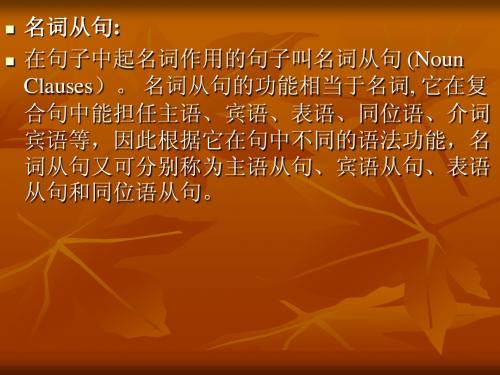
6. _____ that there is another good harvest this year. A. It says B. It is said C. It was said D. He was said 7. Take _____ much you want and _____ you want to. A. however/when B. whenever/how C. however/whoever D. however/whenever 8. It is strange _____. A. that no one should like this book B. that no one liked this book C. that why no one likes this book D. why no one likes this book 9. It is suggested that the experiment _____ under low temperature. A. makes B. is make C. should be made D. will be made 10. _____ still needs to be discussed. A. How is the plan to be carried out B. How the plan is to be carried out C. Why is the plan carried out D. Why the plan carried out
if, whether引导的名词从句 主语:Whether the plan is feasible remains to be proved. 宾语:Let us know whether / if you can finish the article before Friday. 表语:The point is whether we should lend him the money. 同位语:They are investigating the question whether the man is trustworthy. 形容词宾语: She‘s doubtful whether we shall be able to come. 介词宾语: I worry about whether he can pass through the crisis of his illness. 我担心他是否 能度过疾病的危险期。
语法解析名词性从句与状语从句的相似之处
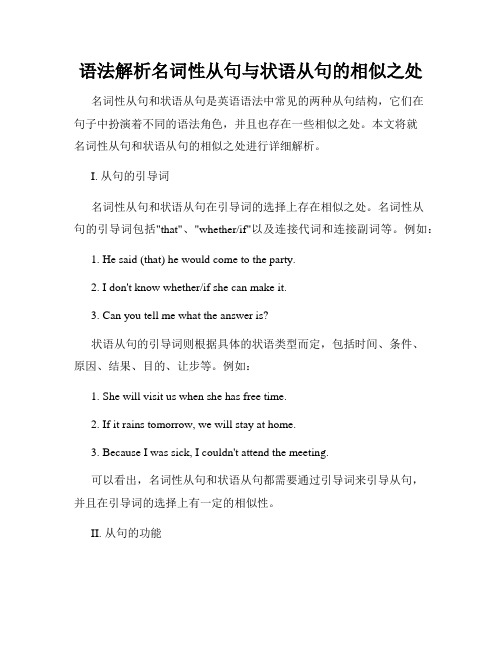
语法解析名词性从句与状语从句的相似之处名词性从句和状语从句是英语语法中常见的两种从句结构,它们在句子中扮演着不同的语法角色,并且也存在一些相似之处。
本文将就名词性从句和状语从句的相似之处进行详细解析。
I. 从句的引导词名词性从句和状语从句在引导词的选择上存在相似之处。
名词性从句的引导词包括"that"、"whether/if"以及连接代词和连接副词等。
例如:1. He said (that) he would come to the party.2. I don't know whether/if she can make it.3. Can you tell me what the answer is?状语从句的引导词则根据具体的状语类型而定,包括时间、条件、原因、结果、目的、让步等。
例如:1. She will visit us when she has free time.2. If it rains tomorrow, we will stay at home.3. Because I was sick, I couldn't attend the meeting.可以看出,名词性从句和状语从句都需要通过引导词来引导从句,并且在引导词的选择上有一定的相似性。
II. 从句的功能名词性从句在句子中担任名词的功能,可以充当主语、宾语、表语以及介词的宾语等。
例如:1. What she said is true.(名词性从句作主语)2. I don't know where he lives.(名词性从句作宾语)3. His wish is that he can travel around the world.(名词性从句作表语)4. We are looking forward to the day when we can meet again.(名词性从句作介词的宾语)状语从句则用来对整个句子或者谓语动词进行修饰,从而在句子中担任副词的功能。
名词性从句与状语关系分析

名词性从句与状语关系分析在英语语法中,名词性从句和状语从句是两种重要的句子结构。
名词性从句在句子中起到名词的作用,可以充当主语、宾语、表语或同位语;而状语从句则起到状语的作用,修饰其他成分。
本文将分析名词性从句和状语从句之间的关系。
一、名词性从句的定义与作用名词性从句是一种从句,可以在句子中起到名词的作用。
它所包含的从句成分根据从句的功能而定,可以充当主语、宾语、表语或同位语。
作为主语:What you said is true.(你说的是真的。
)作为宾语:I know that he is a doctor.(我知道他是个医生。
)作为表语:The problem is whether we can finish it on time.(问题在于我们是否能够按时完成。
)作为同位语:Her belief that everything happens for a reason gives her strength.(她坚信一切都有原因,这给了她力量。
)二、状语从句的定义与作用状语从句是一种从句,在句子中作为状语,对其他成分进行修饰。
状语从句可以表示时间、地点、原因、条件、方式等多种关系。
时间状语从句:When he arrived, we had already left.(当他到达时,我们已经离开了。
)地点状语从句:Wherever you go, I will follow.(无论你去哪里,我都会跟随。
)原因状语从句:Because it was raining, we stayed indoors.(因为下雨了,我们待在室内。
)条件状语从句:If you study hard, you will pass the exam.(如果你努力学习,你会通过考试。
)方式状语从句:She sings as if she were a professional singer.(她唱歌的样子好像是一名专业歌手。
名词性从句和状语从句
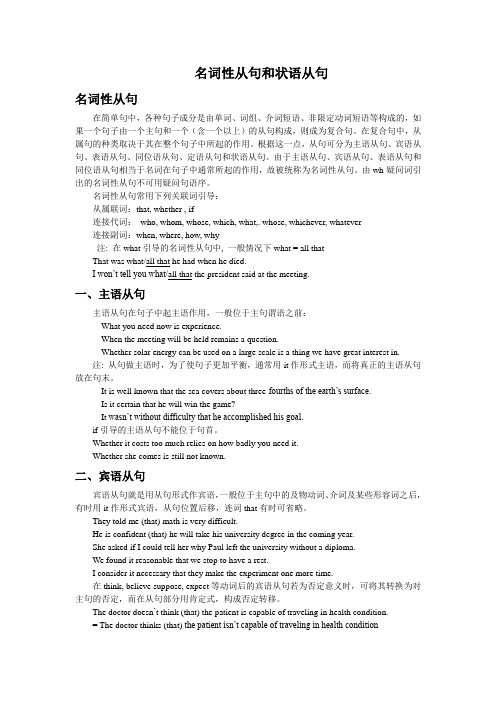
名词性从句和状语从句名词性从句在简单句中,各种句子成分是由单词、词组、介词短语、非限定动词短语等构成的,如果一个句子由一个主句和一个(含一个以上)的从句构成,则成为复合句。
在复合句中,从属句的种类取决于其在整个句子中所起的作用。
根据这一点,从句可分为主语从句、宾语从句、表语从句、同位语从句、定语从句和状语从句。
由于主语从句、宾语从句、表语从句和同位语从句相当于名词在句子中通常所起的作用,故被统称为名词性从句。
由wh-疑问词引出的名词性从句不可用疑问句语序。
名词性从句常用下列关联词引导:从属联词:that, whether , if连接代词:who, whom, whose, which, what,. whose, whichever, whatever连接副词:when, where, how, why注: 在what引导的名词性从句中, 一般情况下what = all thatThat was what/all that he had when he died.I won’t tell you what/all that the president said at the meeting.一、主语从句主语从句在句子中起主语作用,一般位于主句谓语之前:What you need now is experience.When the meeting will be held remains a question.Whether solar energy can be used on a large scale is a thing we have great interest in.注: 从句做主语时,为了使句子更加平衡,通常用it作形式主语,而将真正的主语从句放在句末。
It is well known that the sea covers about three-fourths of the earth’s surface.Is it certain that he will win the game?It wasn’t without difficulty that he accomplished his goal.if引导的主语从句不能位于句首。
状语从句和名词性从句

3)as倒装--“虽然/尽管”
e.g. Late as it was, they kept on working. Child as he is, he knows a lot. Much as I admire his father, I don’t
like John. Try as you may, you might fail as
called. 2.一些含有time的名词短语,如every time, each time,
next time, by the time等,以及the day, the year, the morning等,也可引导一个时间状语从句。
The day he returned home, his father was already
1、各种从属连词的含义及用法
比较;
考
2、no matter wh- 与 wh-ever 引 导的从句的区别;
点 3、状语从句的时态问题;
难 4、状语从句倒装及紧缩问题; 点 5、状语从句与其它从句的区别。
1. 时间状语从句
1. (04北京春) We were swimming in the lake ___A___ suddenly the
专
项 复
Hale Waihona Puke 状语从句习状语从句有九种, 时地原因条状补, 目比结果方让步, 连词引导各不同; 主句通常前面走, 连词引导紧随后, 从句若在主前头, 主从之间有个逗。
时间状语从句 原因状语从句 地点状语从句 目的状语从句 结果状语从句 条件状语从句 让步状语从句 比较状语从句 方式状语从句
状语从句的分类
A. He hardly had
B. Had he hardly
状语从句和名词性从句的区别与联系
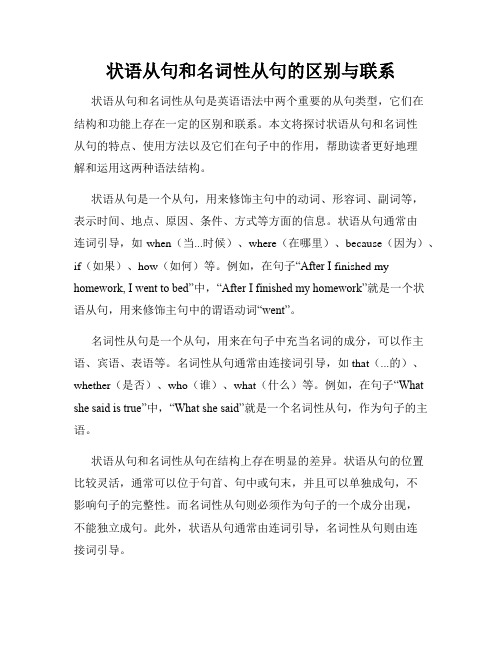
状语从句和名词性从句的区别与联系状语从句和名词性从句是英语语法中两个重要的从句类型,它们在结构和功能上存在一定的区别和联系。
本文将探讨状语从句和名词性从句的特点、使用方法以及它们在句子中的作用,帮助读者更好地理解和运用这两种语法结构。
状语从句是一个从句,用来修饰主句中的动词、形容词、副词等,表示时间、地点、原因、条件、方式等方面的信息。
状语从句通常由连词引导,如when(当...时候)、where(在哪里)、because(因为)、if(如果)、how(如何)等。
例如,在句子“After I finished my homework, I went to bed”中,“After I finished my homework”就是一个状语从句,用来修饰主句中的谓语动词“went”。
名词性从句是一个从句,用来在句子中充当名词的成分,可以作主语、宾语、表语等。
名词性从句通常由连接词引导,如that(...的)、whether(是否)、who(谁)、what(什么)等。
例如,在句子“What she said is true”中,“What she said”就是一个名词性从句,作为句子的主语。
状语从句和名词性从句在结构上存在明显的差异。
状语从句的位置比较灵活,通常可以位于句首、句中或句末,并且可以单独成句,不影响句子的完整性。
而名词性从句则必须作为句子的一个成分出现,不能独立成句。
此外,状语从句通常由连词引导,名词性从句则由连接词引导。
另外,状语从句和名词性从句在句子中的作用也存在区别。
状语从句用来修饰或限制主句中的动作或状态,起到补充说明的作用。
它可以表示时间、地点、原因、条件等等。
而名词性从句则充当名词的角色,可以出现在主语、宾语、表语等位置,承担主要的句子成分。
虽然有着明显的差异,状语从句和名词性从句在语法功能上也存在联系。
首先,它们都是从句结构,都可以在句子中起到进一步说明或充实句子意义的作用。
名词性从句与状语从句的区别

名词性从句与状语从句的区别名词性从句是从句充当句子的主语、宾语、表语或同位语,而状语从句则充当句子的状语。
本文将从用法、结构和功能三个方面来详细分析名词性从句和状语从句的区别。
一、用法上的区别名词性从句可以用作句子的主语、宾语、表语或同位语。
例如:1. 主语:What he said is true.(他所说的是真的。
)2. 宾语:I don't know what she wants.(我不知道她想要什么。
)3. 表语:His dream is that he becomes a doctor.(他的梦想是成为一名医生。
)4. 同位语:The fact that he passed the exam surprised everyone.(他通过考试的事实让大家都感到惊讶。
)而状语从句则可以用作时间、条件、原因、目的、方式、地点等状语。
例如:1. 时间状语从句:I will call you when I arrive.(我到达时会给你打电话。
)2. 条件状语从句:If it rains, we will stay at home.(如果下雨,我们就呆在家里。
)3. 原因状语从句:He failed the exam because he didn't study hard.(他没通过考试是因为他没有好好学习。
)4. 目的状语从句:She works hard so that she can achieve her goals.(她努力工作以便实现她的目标。
)5. 方式状语从句:He speaks as if he were a native speaker.(他说话的方式像是一个本土人。
)6. 地点状语从句:They went hiking where there was a beautiful waterfall.(他们去爬山的地方有个美丽的瀑布。
)二、结构上的区别名词性从句的引导词通常包括what, that, whether, who, whom, whose, which, whoever, whomever, whichever等。
状语从句与名词性从句的区别及用法解析
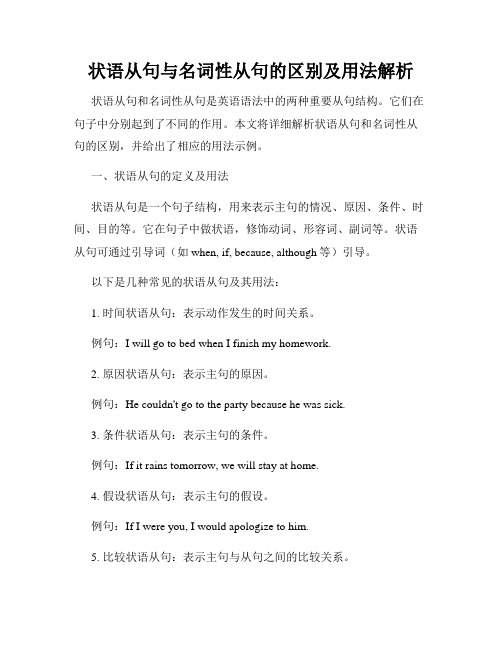
状语从句与名词性从句的区别及用法解析状语从句和名词性从句是英语语法中的两种重要从句结构。
它们在句子中分别起到了不同的作用。
本文将详细解析状语从句和名词性从句的区别,并给出了相应的用法示例。
一、状语从句的定义及用法状语从句是一个句子结构,用来表示主句的情况、原因、条件、时间、目的等。
它在句子中做状语,修饰动词、形容词、副词等。
状语从句可通过引导词(如when, if, because, although等)引导。
以下是几种常见的状语从句及其用法:1. 时间状语从句:表示动作发生的时间关系。
例句:I will go to bed when I finish my homework.2. 原因状语从句:表示主句的原因。
例句:He couldn't go to the party because he was sick.3. 条件状语从句:表示主句的条件。
例句:If it rains tomorrow, we will stay at home.4. 假设状语从句:表示主句的假设。
例句:If I were you, I would apologize to him.5. 比较状语从句:表示主句与从句之间的比较关系。
例句:He runs faster than I do.二、名词性从句的定义及用法名词性从句是一个句子结构,用来充当名词在句子中的作用,可以担任主语、宾语、表语和同位语等。
名词性从句可通过引导词(如that, whether, what, who等)引导。
以下是几种常见的名词性从句及其用法:1. 主语从句:作为句子的主语。
例句:What he said is true.2. 宾语从句:作为及物动词或介词的宾语。
例句:She asked me where I was going.3. 表语从句:作为系动词的表语。
例句:Her dream is that she can travel around the world.4. 同位语从句:与名词在意义上相同。
状语从句与名词性从句的区别与用法总结
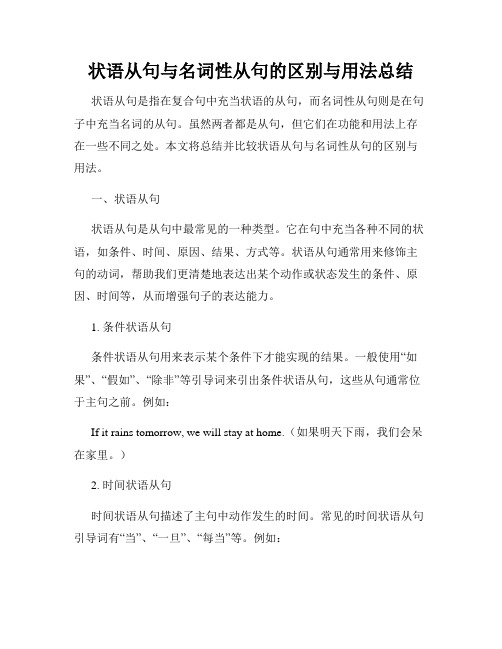
状语从句与名词性从句的区别与用法总结状语从句是指在复合句中充当状语的从句,而名词性从句则是在句子中充当名词的从句。
虽然两者都是从句,但它们在功能和用法上存在一些不同之处。
本文将总结并比较状语从句与名词性从句的区别与用法。
一、状语从句状语从句是从句中最常见的一种类型。
它在句中充当各种不同的状语,如条件、时间、原因、结果、方式等。
状语从句通常用来修饰主句的动词,帮助我们更清楚地表达出某个动作或状态发生的条件、原因、时间等,从而增强句子的表达能力。
1. 条件状语从句条件状语从句用来表示某个条件下才能实现的结果。
一般使用“如果”、“假如”、“除非”等引导词来引出条件状语从句,这些从句通常位于主句之前。
例如:If it rains tomorrow, we will stay at home.(如果明天下雨,我们会呆在家里。
)2. 时间状语从句时间状语从句描述了主句中动作发生的时间。
常见的时间状语从句引导词有“当”、“一旦”、“每当”等。
例如:When I was young, I used to play soccer every day.(当我年轻的时候,我每天都踢足球。
)3. 原因状语从句原因状语从句用来表示主句中某个动作发生的原因。
常用的引导词有“因为”、“由于”、“既然”等。
例如:Because it's raining, we can't go out for a picnic.(因为下雨,我们不能出去野餐。
)4. 结果状语从句结果状语从句用来表示某个动作或条件导致的结果或后果。
常见的引导词有“所以”、“因此”、“以便”等。
例如:He studied hard, so he passed the exam.(他努力学习,所以考试通过了。
)二、名词性从句名词性从句是从句中充当名词的一种从句。
名词性从句可以作主语、宾语、表语或同位语,起到和名词相同的作用。
名词性从句通常用来引出句子的核心含义,起到连接上下文的作用。
语法解析名词性从句与状语从句的不同之处
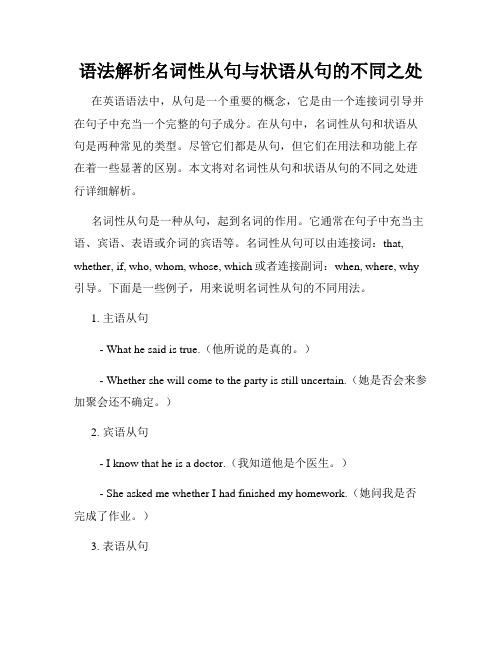
语法解析名词性从句与状语从句的不同之处在英语语法中,从句是一个重要的概念,它是由一个连接词引导并在句子中充当一个完整的句子成分。
在从句中,名词性从句和状语从句是两种常见的类型。
尽管它们都是从句,但它们在用法和功能上存在着一些显著的区别。
本文将对名词性从句和状语从句的不同之处进行详细解析。
名词性从句是一种从句,起到名词的作用。
它通常在句子中充当主语、宾语、表语或介词的宾语等。
名词性从句可以由连接词:that, whether, if, who, whom, whose, which或者连接副词:when, where, why 引导。
下面是一些例子,用来说明名词性从句的不同用法。
1. 主语从句- What he said is true.(他所说的是真的。
)- Whether she will come to the party is still uncertain.(她是否会来参加聚会还不确定。
)2. 宾语从句- I know that he is a doctor.(我知道他是个医生。
)- She asked me whether I had finished my homework.(她问我是否完成了作业。
)3. 表语从句- The problem is whether we can finish it on time.(问题在于我们能否按时完成。
)- The fact that he passed the exam surprised everyone.(他通过考试的事实让大家感到惊讶。
)4. 介词宾语从句- I'm not sure about which restaurant we should go to.(我不确定我们应该去哪个餐厅。
)- She told me about what happened at the meeting.(她告诉了我会议上发生的事情。
)状语从句是一种从句,起到状语的作用。
语法中的状语从句和名词性从句的区别
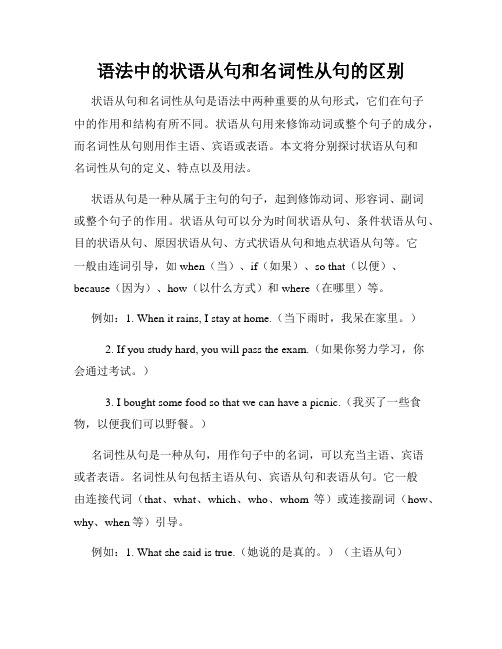
语法中的状语从句和名词性从句的区别状语从句和名词性从句是语法中两种重要的从句形式,它们在句子中的作用和结构有所不同。
状语从句用来修饰动词或整个句子的成分,而名词性从句则用作主语、宾语或表语。
本文将分别探讨状语从句和名词性从句的定义、特点以及用法。
状语从句是一种从属于主句的句子,起到修饰动词、形容词、副词或整个句子的作用。
状语从句可以分为时间状语从句、条件状语从句、目的状语从句、原因状语从句、方式状语从句和地点状语从句等。
它一般由连词引导,如when(当)、if(如果)、so that(以便)、because(因为)、how(以什么方式)和where(在哪里)等。
例如:1. When it rains, I stay at home.(当下雨时,我呆在家里。
)2. If you study hard, you will pass the exam.(如果你努力学习,你会通过考试。
)3. I bought some food so that we can have a picnic.(我买了一些食物,以便我们可以野餐。
)名词性从句是一种从句,用作句子中的名词,可以充当主语、宾语或者表语。
名词性从句包括主语从句、宾语从句和表语从句。
它一般由连接代词(that、what、which、who、whom等)或连接副词(how、why、when等)引导。
例如:1. What she said is true.(她说的是真的。
)(主语从句)2. I don't know where he went.(我不知道他去哪里了。
)(宾语从句)3. The problem is how we can solve it.(问题是我们该如何解决。
)(表语从句)通过上面的例句可以看出,状语从句主要用来修饰主句的动作或状态,起到给出更多信息的作用;而名词性从句则起到名词的作用,可以充当主语、宾语或表语,承担句子中的核心成分。
状语从句与名词性从句
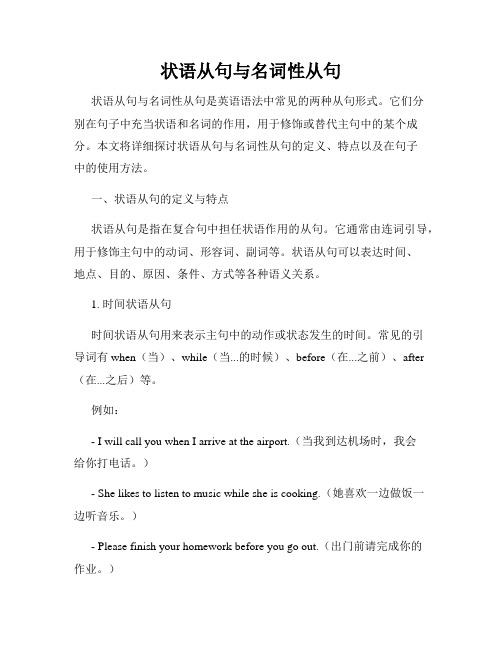
状语从句与名词性从句状语从句与名词性从句是英语语法中常见的两种从句形式。
它们分别在句子中充当状语和名词的作用,用于修饰或替代主句中的某个成分。
本文将详细探讨状语从句与名词性从句的定义、特点以及在句子中的使用方法。
一、状语从句的定义与特点状语从句是指在复合句中担任状语作用的从句。
它通常由连词引导,用于修饰主句中的动词、形容词、副词等。
状语从句可以表达时间、地点、目的、原因、条件、方式等各种语义关系。
1. 时间状语从句时间状语从句用来表示主句中的动作或状态发生的时间。
常见的引导词有when(当)、while(当...的时候)、before(在...之前)、after (在...之后)等。
例如:- I will call you when I arrive at the airport.(当我到达机场时,我会给你打电话。
)- She likes to listen to music while she is cooking.(她喜欢一边做饭一边听音乐。
)- Please finish your homework before you go out.(出门前请完成你的作业。
)- After she finished her work, she went home.(她完成工作后回家了。
)2. 地点状语从句地点状语从句用来表示主句中的动作或状态发生的地点。
常见的引导词有where(在哪里)、wherever(无论在哪里)等。
例如:- I will meet you where we agreed yesterday.(我会在我们昨天约定的地方见你。
)- You can sit wherever you like in the classroom.(在教室里你可以坐在任何你喜欢的地方。
)3. 目的状语从句目的状语从句用来表示主句中的动作或状态的目的。
常见的引导词有so that(以便)、in order that(为了)等。
语法突破名词性从句与状语从句的语序与标点
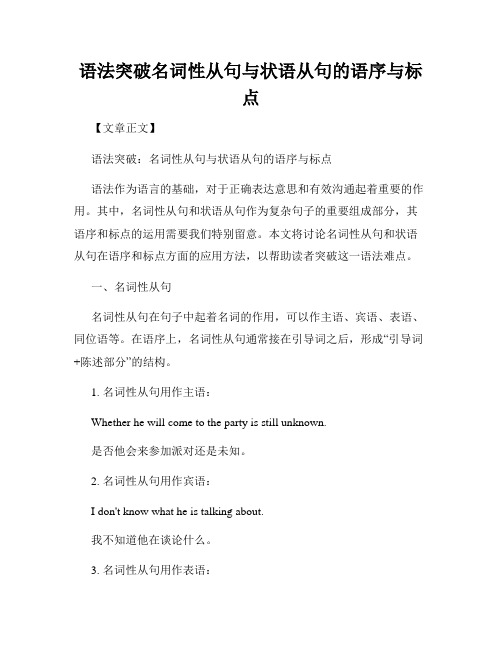
语法突破名词性从句与状语从句的语序与标点【文章正文】语法突破:名词性从句与状语从句的语序与标点语法作为语言的基础,对于正确表达意思和有效沟通起着重要的作用。
其中,名词性从句和状语从句作为复杂句子的重要组成部分,其语序和标点的运用需要我们特别留意。
本文将讨论名词性从句和状语从句在语序和标点方面的应用方法,以帮助读者突破这一语法难点。
一、名词性从句名词性从句在句子中起着名词的作用,可以作主语、宾语、表语、同位语等。
在语序上,名词性从句通常接在引导词之后,形成“引导词+陈述部分”的结构。
1. 名词性从句用作主语:Whether he will come to the party is still unknown.是否他会来参加派对还是未知。
2. 名词性从句用作宾语:I don't know what he is talking about.我不知道他在谈论什么。
3. 名词性从句用作表语:The problem is whether we should continue this project.问题在于我们是否应该继续这个项目。
4. 名词性从句用作同位语:The fact that she lied surprised me.她撒谎的事实让我感到惊讶。
在标点上,名词性从句与主句之间一般使用逗号进行分隔。
需要注意的是,在名词性从句中,如果从句本身已经使用了逗号做其他用途,此时主句与从句之间应使用分号或者冒号进行分隔。
例句:He insists that I should go with him, but I have other plans.他坚持要我跟他一起去,但我有其他计划。
二、状语从句状语从句在句子中起着状语的作用,用来修饰其他句子的动作、原因、条件、方式等。
在语序上,状语从句通常接在引导词之后,形成“引导词+陈述部分/谓语部分”的结构。
1. 状语从句表示时间:When the sun sets, the stars appear.当太阳落山时,星星出现了。
英语八大从句类型与用法总结

英语八大从句类型与用法总结从句是句子中的一种结构,可以用来增强句子的表达能力。
英语中常见的八大从句类型包括:1. 名词性从句 (Noun Clauses)名词性从句用来作为名词的替代,可以作为主语、宾语、表语或同位语等。
常见的名词性从句有:主语从句(作主语),宾语从句(作宾语),表语从句(作表语),同位语从句(作同位语)。
2. 定语从句 (Adjective Clauses)定语从句用来对一些名词或代词进行修饰和限定,一般紧跟在被修饰的名词或代词之后。
常见的引导词有:that, which, who, whom, whose 等。
3. 状语从句 (Adverbial Clauses)状语从句用来修饰动词、形容词、副词等,表示时间、地点、原因、条件、结果等。
常见的引导词有:when, while, before, after, since, because, if, unless, so that等。
4. 并列从句 (Coordination Clauses)并列从句是由连词and, but, or等连接在一起的两个或多个独立的主句。
并列从句可以使用逗号或分号分隔。
5. 让步从句 (Concessive Clauses)让步从句用来表示与主句相对抗的情况,常用的引导词有:although, though, even though, while等。
6. 条件从句 (Conditional Clauses)条件从句用来表示其中一种条件,通过条件从句的实现与结果从句的实现之间的关系。
常见的引导词有:if, unless, as long as, provided that等。
7. 结果从句 (Result Clauses)结果从句用来表示主句发生的结果,常见的引导词有:so that, such that, so...that等。
8. 目的从句 (Purpose Clauses)目的从句用来表示主句的目的或意图,常见的引导词有:so that, in order that等。
状语从句与名词性从句的转换
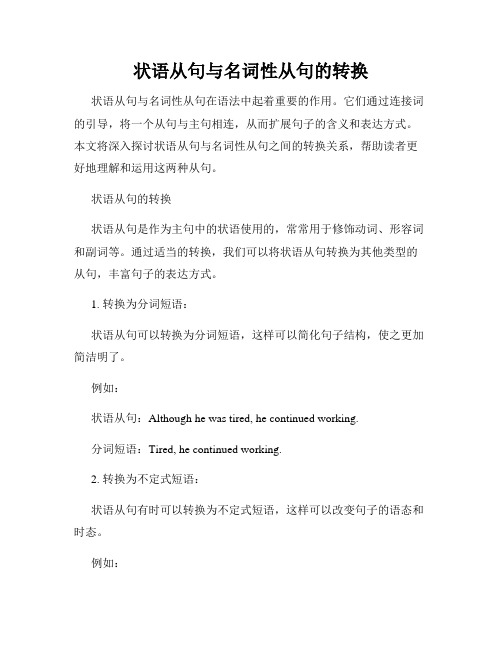
状语从句与名词性从句的转换状语从句与名词性从句在语法中起着重要的作用。
它们通过连接词的引导,将一个从句与主句相连,从而扩展句子的含义和表达方式。
本文将深入探讨状语从句与名词性从句之间的转换关系,帮助读者更好地理解和运用这两种从句。
状语从句的转换状语从句是作为主句中的状语使用的,常常用于修饰动词、形容词和副词等。
通过适当的转换,我们可以将状语从句转换为其他类型的从句,丰富句子的表达方式。
1. 转换为分词短语:状语从句可以转换为分词短语,这样可以简化句子结构,使之更加简洁明了。
例如:状语从句:Although he was tired, he continued working.分词短语:Tired, he continued working.2. 转换为不定式短语:状语从句有时可以转换为不定式短语,这样可以改变句子的语态和时态。
例如:状语从句:When the sun sets, the birds start singing.不定式短语:To see the sun set, the birds start singing.名词性从句的转换名词性从句充当主语、宾语、表语或同位语等成分,起着名词的作用。
在需要转换的情况下,我们可以将名词性从句转换为其他类型的从句,以增强句子的表达效果。
1. 转换为简化句:名词性从句可以通过简化句子的结构来转换。
这样可以使句子更加简洁明了。
例如:名词性从句:What she said is true.简化句:Her words are true.2. 转换为动名词短语:名词性从句有时可以转换为动名词短语,这样可以增加句子的动态性和流畅度。
例如:名词性从句:Whether she will come is uncertain.动名词短语:Her coming is uncertain.综合运用除了以上的转换方式外,我们还可以根据具体的语境和表达需要,综合运用状语从句和名词性从句的转换。
语法中的状语从句和名词性从句的区别与联系
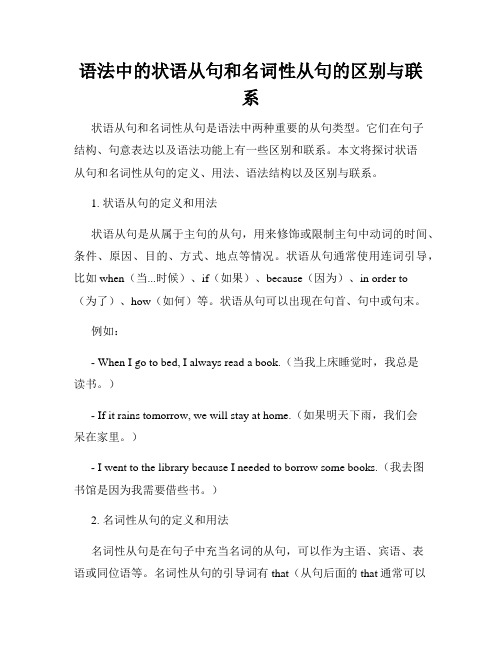
语法中的状语从句和名词性从句的区别与联系状语从句和名词性从句是语法中两种重要的从句类型。
它们在句子结构、句意表达以及语法功能上有一些区别和联系。
本文将探讨状语从句和名词性从句的定义、用法、语法结构以及区别与联系。
1. 状语从句的定义和用法状语从句是从属于主句的从句,用来修饰或限制主句中动词的时间、条件、原因、目的、方式、地点等情况。
状语从句通常使用连词引导,比如when(当...时候)、if(如果)、because(因为)、in order to(为了)、how(如何)等。
状语从句可以出现在句首、句中或句末。
例如:- When I go to bed, I always read a book.(当我上床睡觉时,我总是读书。
)- If it rains tomorrow, we will stay at home.(如果明天下雨,我们会呆在家里。
)- I went to the library because I needed to borrow some books.(我去图书馆是因为我需要借些书。
)2. 名词性从句的定义和用法名词性从句是在句子中充当名词的从句,可以作为主语、宾语、表语或同位语等。
名词性从句的引导词有that(从句后面的that通常可以省略)、if(是否)、whether(是否)和wh-词(who、what、when、where、why等)。
例如:- What he said made me happy.(他说的话让我开心。
)(作宾语)- Whether we go or not is up to you.(我们去不去由你决定。
)(作主语)- This is where we met for the first time.(这是我们第一次见面的地方。
)(作表语)3. 状语从句和名词性从句的语法结构状语从句和名词性从句的语法结构有所不同。
状语从句通常由一个主语和谓语构成,可以独立成句。
- 1、下载文档前请自行甄别文档内容的完整性,平台不提供额外的编辑、内容补充、找答案等附加服务。
- 2、"仅部分预览"的文档,不可在线预览部分如存在完整性等问题,可反馈申请退款(可完整预览的文档不适用该条件!)。
- 3、如文档侵犯您的权益,请联系客服反馈,我们会尽快为您处理(人工客服工作时间:9:00-18:30)。
连词填空A 从属连词(名词性从句)1.______ we’ll go camping tomorrow depends on the weather.2._______ we go swimming every day does us a lot of good.3.______will pick him up is not decided.4._______ he'll come or not isn't important.5._______ class will win the match is not clear so far.6._______ he will go abroad is being discussed.7._______ I spend my summer is none of your business .8._________you have done might do harm to other people.9. _________ he said at the meeting astonished everybody present.10.It is a fact _________ English is accepted as an international language.11. It is still under discussion ________the old bus station should be replaced with amodern hotel or not.12. It is known to all _________ the gun powder was first invented by the Chinese.13. It is still a mystery ______ caused the accident.14. I want to know _______he can come here on time.15. —Do you remember ________ he came? —Yes, I do, he came by car.16. —What did your parents think about your decision?—They always let me do __________ I think I should.17. He said ________ she would leave the message on the headmaster's desk.18. There is no doubt ________they he will win the game.19. I doubt ________he will come.20. I don’t doubt ________he will come.21. I was really surprised at ______ I saw.22. We are talking about ____________we admit students into our club.23. They are worrying about ____________ they can get there in time.24. She was praised for ______ she had done.25. We all find it important ______ we (should) make a quick decision about this matter26. I think it necessary ______ we take plenty of hot water every day .27. The problem was ______ could do the work.28. That's ______ he is worrying about.29. That's ______we never thought of it.30. The fact is ______ we have lost the game.31. The reason why he was late was ______he missed the train by one minute thismorning32. My suggestion is ______ we (should) start early tomorrow.33. He is ill. That’s ______ he is absent.34. -- I drove to Zhuhai for the air show last week. -- Is that ____ you had a few days off?35. The news ____ he was kidnapped surprised us greatly.36. His suggestion ____ the meeting be delayed was turned down.37. The thought ____ he might fail in the exam worried him.38. I have no idea ____ he will start.39. The order ____ the prisoner be set free arrived too late.40. He often asked me the question ____ the work was worth doing.41. The question is _____ the film is worth seeing.42. Do you doubt ________ I believe you?43. We were all very worried over the fact _____ you were ill.44. It looks ______ it's going to rain.45. This museum is not ______ it was ten years ago.46. The reason for his success is _______ he worked hard.47.She dresses well,but the trouble is________ the clothes she is wearing don’t go with each other very well.48. Einstein's most famous theory is ____ we call the Theory of Relativity.49. The suggestion________ students should learn some practical knowledge is worth considering.50. The old woman was shocked by____ had happened to her daughter.51. Lei Feng was always thinking of________ he could help others.52. Could you tell me for _____ you have bought this fur coat?53.______ we have seen is quite from______ we have heard.54. There are three books on the desk. I don’t know________ one he will choose.55. We have plenty of books here. You may take _____one you like best.56. It depends on ______ we have enough time.57. You have no idea ______ anxious I have been for her safety.58. Now we can see _____ a serious problem the population is .59. I want to buy some stamps. Can you tell me _____ there's a post office near here?60. It has not been decided yet________ the meeting will start at the hall.61. There’s some doubt_____ she will be able to repay the money on time.62. My radio doesn’t work. I don’t know _______ the trouble is.63 ______ you go or stay at home won't make any difference.64. Is _____ you told me really true?65. After months of research there was little hope______ the lost car might be found.66. ____he doesn't like them is very clear.67._____ you don’t like him is none of my business.68. Perseverance is a kind of quality—and that’s_______ it takes to do anything well.69.________ knowledge comes from practice is known to all.70. The fire destroyed________ was in the building.71. We know little about the young lady except_______ you told me.72. I know nothing about her except_______ she is from Canada.73 .The question he asked was________ the electrical equipment should be stored.74.________ there is life on another planet is almost impossible.75. Please give the book to______ wins the first prize.76. The chance______he will attend the meeting is very little.77. It so happened ______ I had no money on me.78. Mark wondered ______ you thought of the new film.79. Some of the scientists held the view that ______ the book said was right.80. He was driving at ______ I thought was a fantastic speed.B 从属连词(状语从句)1._________ he comes tomorrow, I shall ask where he has been.2._________ he was speaking, everybody listened carefully.3. _________ the work was done, we sat down to sum up experience.4. He had learned Chinese _________ he came to China.5. W e’d better take him to hospital _________it is too late.6. I waited ________ he came back.7. The little boy won’t go to sleep __________his mother tells him a story8.----Is David at school today? ---No. He is at home ______he has a bad cold.9. We will go to the park ______it doesn't rain tomorrow.10._______they decide which college to go to, students should research the admission p rocedures.11. John thinks it won’t be long ________ he is ready for his new job.12. When you read the book, you’d better make a mark ________you have question.13. ________there is water and air, there are living things.14. Father told me ________ I worked hard he would buy me a gift.15. ________ you begin, never stop.16. You’ll never make progress ________you st udy hard.17. you want me to fire you, I suggest you stop wearing sport clothes at office.18.________air traffic is closely controlled, flying is relatively safe.19. It was a long time ________I met her last.20. I haven't seen him _________ he moved to the other side of the town.21. He won’t finish doing the exercises in time ________he isn’t a diligent student.22. _________you can’t answer the question, I’ll ask someone else.23.I was about to leave my house ________ the phone rang.24. ______she is young, she knows quite a lot.25. _____ born in Chicago, the author was famous for his stories about New York.26. ___ the day went on, the weather got worse.27.Babies sleep 16 to 18 hours in every 24hours, and they sleep less ________ they grow older.28. I would appreciate it _______ you call back this afternoon for the doctor’s appointment.29. They went on working _____ _____ it was late at night.30. I hurried _____ _____ I wouldn’t be late for class.31. Mr. Smith has learned some Chinese ______ he came to Shenzhen.32. The earth goes around the sun _______the moon goes around earth.33. A new school was built ______there had once been a wasteland.34. ______ you’ve got such a golden chance, wh y not make the best of it?35. A whole month had passed _______ she fully recovered.36. You mustn’t leave _______ you get your work done by 6o’clock.37. Please keep reading the poem _______ you have remembered it.38. I won’t tell him the correct answer ________ _______I know it. I don’t like him.39. He was walking _______ _______he was drunk.40. Why do you want a new job_______ you’ve got such a good one already?41. _______ I like Chuan food, I won’t visit that restaurant today. I’d like to try a different one.42. Roses need special care _______ _______they can live through winter.43. You will succeed in the end _______ you give up halfway.44. It is almost 16 years _______ I last met Sarah.45. I got up early _______ _______ I might not miss the first bus.46. The baby may be saved _______ he is sent to hospital in no time.47. ________ he is rich enough, still he spends very little on clothes and food.48. I didn’t know what happened. He had rushed out of the room ___ I could ask him.49. You won’t get your basketball back ______ you have promised not to play in my garden anymore.50. It was not yet 7 o’clock ______ he came back.51. Can you imagine how long it will be ______ a new drug is invented for AIDS?52. I had no sooner gone into the classroom _______ the bell rang.53. _________ you understand the rule, you will find it very easy to obey.54. I found all the doors open and everything in disorder _______ I arrived home.55. _______ he is a newcomer, he has few friends around here.56. He was in ______ a hurry _____ he forgot his keys.57. Please do the experiment ______ the teacher told you to.58. He wouldn’t listen to me, _______ I said.59. Small town ______ it is, yet it is very famous.50. He asked me ______many questions at a time_______ I didn’t know how to answer.61. I will take you shopping _______ it doesn’t rain this afternoon.62. He failed again just _______ he didn’t work hard at his lessons.63. You need to practice quite a lot _______ your spoken English becomes excellent.64. Karl Marx kept on studying English ________ he could use it freely.65. He is only a kid, but he speaks ______ ______he were a grown up.66. Let’s go out for a walk ______ you are too tired.67. He made _______ little money ______ his wife often complained.68. I have learned a lot of French ______ I came to Paris.69. All the students stopped talking _______ I entered the classroom.70. I will buy that apartment _______ much it costs.A 从属连词(名词性从句)1 Whether2 That3 Who4 Whether 5Which 6 When 7 Where 8 What 9 What 10 that 11 whether 12 that 13 what 14 whether/if 15 how 16 what 17 that 18 that 19 whether/if 20 that 21 what 22 whether 23 whether 24 what 25 that 26 that 27 who 28 what 29 because 30 that 31 that 32 that 33 why 34 why 35 that 36 that 37 that 38 when 39 that 40 whether 41 whether 42 that 43 that 44 as if 45 what 46 that 47 that 48 what 49 that 50 what 51 how 52 whom 53 What; what 54 which 55 whichever 56 whether 57 how 58 what 59 if/whether 60 when 61 that 62 where 63 whether 64 what 65 that 66 That 67 that 68 what 69 That 70 what 71 wh at 72 that 73 where 74 That 75 whoever 76 that77 that 78 what 79 what 80 whatB 从属连词(状语从句)1.When2. While / When3. After4.before5.before6. till/until7. until8.because9. if 10.Once 11 before 12 where 13where 14 if 15 Once 16 unless 17Unless 18 Once 19 since 20 since 21 because 22 Since 23 when 24. Although 25 Although 26 As 27 as 28 if 29 even if 30 so that31 since 32 as 33 where 34 Since/ Now that 35 before 36 until 37 until 38 even if/even though 39 as if/as though 40 when 41 Although 42 so that 43 unless 44 since 45 so that 46 if/ so long as 47 Although 48 before 49 until 50 when 51 before 52 than 53 Once 54 as soon as/when /the moment 55 Because 56 such.. that 57 as 58 before 59 as 60 so that 61 if 62 because 76 before 64 until 65 as if 66 unless 67 so..that 68 since 69 when/as soon as 70 however/no matter how。
